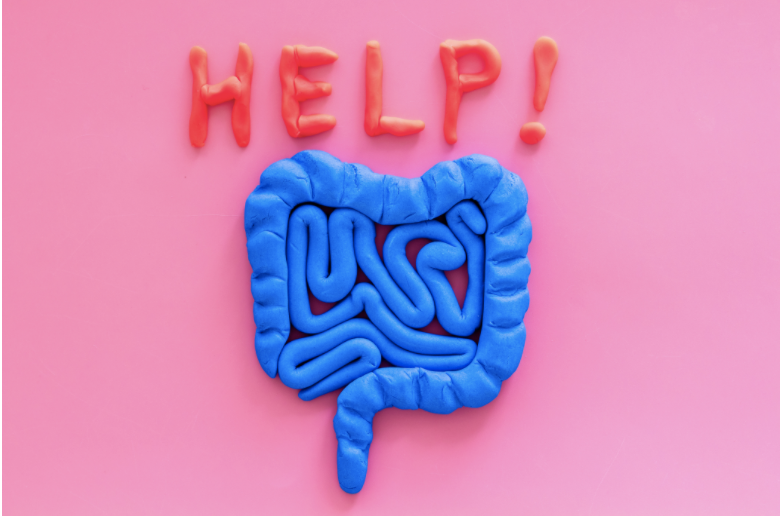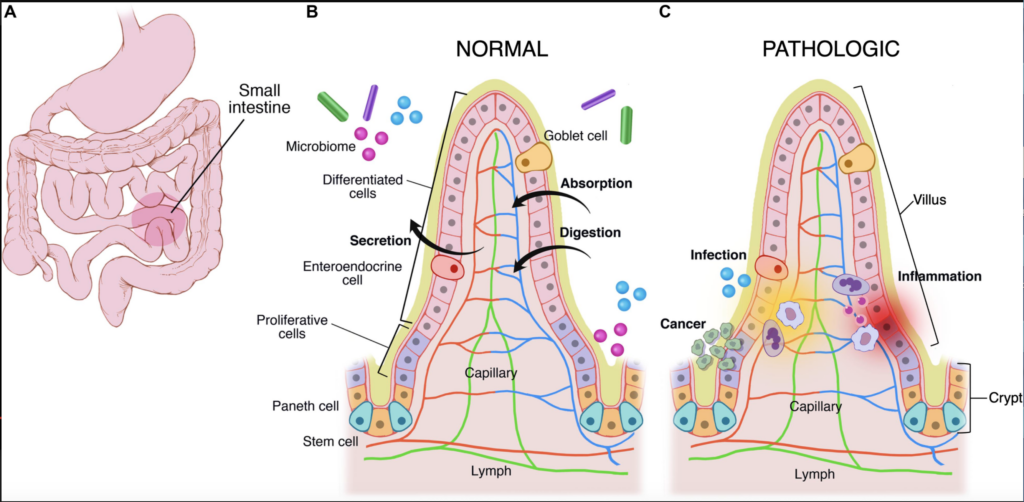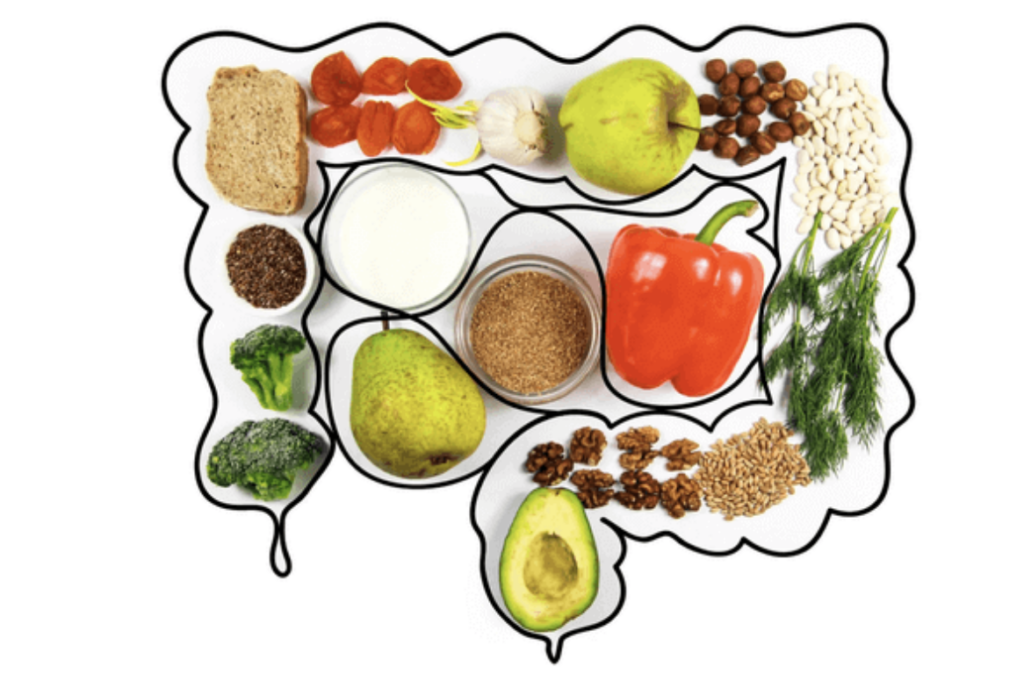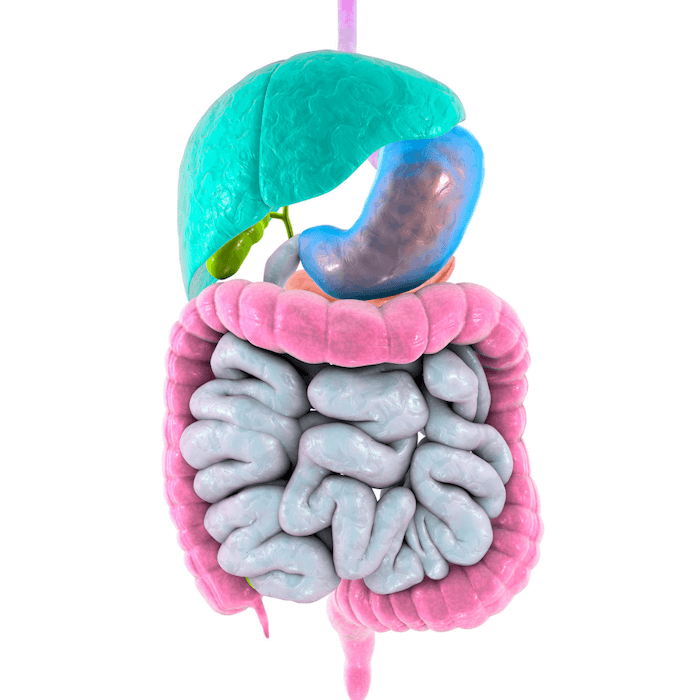Do you suffer from gut problems, fatigue, mood issues, hormone imbalances, skin conditions, or autoimmune disorders? Conventional medicine often dismisses Leaky gut even though it’s a common ailment affected by lifestyle, diet, medications, and environmental factors.
I’m sure you’re wondering, what exactly is leaky gut? Could you have it? If so, how do you fix a leaky gut? If you’ve been experiencing chronic health issues that you can’t seem to get a grip on, keep reading for a deep dive on leaky gut, common symptoms, functional lab tests you can run, and how to heal.
By the end of this blog, you will understand the impact that intestinal permeability can have on your body, what you can do about it, and the steps you can start taking today to fix a leaky gut.
What is Leaky Gut?
The digestive tract is a complex system made up of your mouth, esophagus, stomach, gallbladder, pancreas, liver, small intestine, and large intestine. These organs work together to break down food into smaller molecules that the body is able to absorb and convert into energy for growth, and repair by all of your cells. But not everything we consume will be or should be absorbed.
Did you know the gastrointestinal tract is actually outside of your body? This is because the lumen, the lining of the intestine that absorbs nutrients into the bloodstream, is open to the external environment on both ends. A layer of cells separates the inside of the body from the external environment in order to protect us from harmful substances. Between each cell is a space called a “tight junction”, which makes sure nothing unwanted enters the bloodstream by keeping cells close together to form a cohesive barrier. Tiny openings in the lining of the GI tract act as a selective barrier, letting through water and essential nutrients while keeping toxins and bacteria out. These toxins are then expelled from the body through our regular bathroom visits throughout the day. Check out this resource for more information on Intestinal Permeability from The Institute of Functional Medicine.
 Increased intestinal permeability becomes an issue when this barrier is compromised and unable to identify or properly separate unwanted substances from the essential nutrients the body needs. When you have a leaky gut, a partially digested protein, allergen, or pathogen can enter the bloodstream. The body will then elicit a natural response better known as inflammation, which in turn causes a further breakdown of the GI tract and a list of symptoms to follow.
Increased intestinal permeability becomes an issue when this barrier is compromised and unable to identify or properly separate unwanted substances from the essential nutrients the body needs. When you have a leaky gut, a partially digested protein, allergen, or pathogen can enter the bloodstream. The body will then elicit a natural response better known as inflammation, which in turn causes a further breakdown of the GI tract and a list of symptoms to follow.
Leaky Gut and Inflammation
 Leaky gut happens when inflammation breaks down the gut lining tissue to make sugar for the blood stream, essentially shredding the gut lining. Now, rather than acting as a selective barrier, the lining becomes more like a sieve. During this process the villi in the intestine become damaged and are now unable to properly absorb fat soluble nutrients. Essential fatty acids, vitamin D, vitamin E, vitamin A, and vitamin K are the main fat-soluble nutrients. They all play integral roles in a multitude of processes in the body. As villi are being destroyed, crypts within the gut lining deepen, hiding parasites and making them difficult to find and treat.
Leaky gut happens when inflammation breaks down the gut lining tissue to make sugar for the blood stream, essentially shredding the gut lining. Now, rather than acting as a selective barrier, the lining becomes more like a sieve. During this process the villi in the intestine become damaged and are now unable to properly absorb fat soluble nutrients. Essential fatty acids, vitamin D, vitamin E, vitamin A, and vitamin K are the main fat-soluble nutrients. They all play integral roles in a multitude of processes in the body. As villi are being destroyed, crypts within the gut lining deepen, hiding parasites and making them difficult to find and treat.
Spaces between tight junctions are enlarged, allowing all types of bacteria, waste particles, and undigested food proteins to “leak” through the barrier and gain access to blood vessels and the lymphatic system. The body is unable to absorb essential nutrients because of damaged villi and is now absorbing harmful things because of leaky gut.
To try and fight these harmful substances, the immune system continues to mount a response creating more inflammation in these areas because the body senses there is something in the bloodstream that does not belong. As you could probably guess, this only damages the gut further.
Pesticides and heavy metals can damage healthy bacteria in the body. This disrupts the delicate balance of the environment in your gut, making room for unhealthy organisms to grow, which further contributes to leaky gut and allows toxins into the bloodstream.
Once a foreign substance enters the bloodstream, it circulates throughout the body setting off an alarm for your immune system, often leading to more inflammation, food allergies/sensitivities, and even autoimmune diseases. While inflammation’s purpose is to keep the body healthy, over time, chronic inflammation can lead to a string of unwanted side effects and may increase your risk of developing a variety of diseases.
Is Leaky Gut a Real Thing?
Leaky gut is often trivialized in chronic health conditions, but healing the gut is one of the main pillars of functional nutrition. There is a lot of ongoing research surrounding the function of the gut barrier and the effects of these perforations in the gut lining. While there is still a lot to be learned about intestinal permeability, researchers are beginning to see the link between gut health and disease prevention. Let’s take a closer look at what current studies support.
It is possible that some people are born with genes that increase the likelihood of leaky gut. Others may develop weakened gut linings through medication or gut infections. Unbalanced diets that are low in fiber and high in sugar and saturated fats may also contribute to weakening the gut lining.
Leaky gut may even be due to your body’s inflammatory response to excess stress. Age may also play a factor; as we age, our cells are more easily damaged and take a longer time to heal. Often, a combination of these factors contribute to the break-down of our gut barrier.
While some leaky gut is normal, in today’s world, most people have increased rates of intestinal permeability. As stated by Dr. Aimee Quinn, the combination of the factors listed above shifts the question from “do I have leaky gut?” to “how bad is my leaky gut?” Knowing how distressed your gut is can help you determine the level of system imbalances you suffer from.
Through nutritional therapeutic interventions, we are able to support the gastrointestinal tract and keep those tight junctions tight. Preventative care is the key to creating a healthy gut and a robust immune system to support you through life.
What Are the Symptoms of Leaky Gut?
Many health professionals fail to recognize and diagnose intestinal permeability for a few reasons. One, the symptoms are similar to other digestive conditions such as food allergies, Irritable Bowel Syndrome (IBS), Crohn’s Disease, Ulcerative Colitis, and Celiac disease. Many of these labels are just a list of symptoms that may actually be directly related to leaky gut and the microbiome. However, some symptoms aren’t “directly” connected to the gut, instead, may manifest as mental, hormonal, or skin issues. The gastrointestinal tract is often not looked at through a functional scope, making these symptoms easier to miss. That being said, here are some indicators that you may have a leaky gut. Are any of them familiar?
Symptoms may include:
- Diarrhea or Constipation
- Abdominal cramping and bloating
- Digestive issues
- Fatigue
- Joint pain
- Difficulty concentrating
- Confusion
- Skin conditions (e.g., acne, rashes, eczema)
- Mood disorders (e.g. anxiety and depression)
- Food intolerances
- Nutrient deficiencies
Research surrounding the relationship between leaky gut and other conditions are currently unclear if other gut conditions are the cause of leaky gut or a symptom of it.
Conditions that may be associated with Leaky Gut:
- Crohn’s disease
- Irritable bowel syndrome (IBS)
- Diabetes
- Polycystic ovarian syndrome (PCOS)
- Liver disease
- Chronic fatigue syndrome
- Autoimmune diseases, such as lupus, multiple sclerosis, and celiac disease
- Hypothyroid/Hashimotos
Gluten and Leaky Gut
Gluten is a protein found in grains such as wheat, barley, and rye, and is made up of the peptides gliadin and glutenin. Gliadin is the part of gluten that some people have a reaction to.
This protein gives bread its airy texture, doughy feel, and is a stabilizing agent in many processed foods. Most people can digest gluten with ease however, others have gluten intolerance, meaning they are sensitive, and some develop a hereditary autoimmune response called Celiac Disease.
In people who are sensitive to gluten (both celiac and non-celiac), the immune system registers gluten as a foreign invader to the body. The body reacts to gluten’s presence through it’s autoimmune response, which leads to inflammation. This reaction to gluten breakdown can lead to symptoms including bloating, diarrhea, and pain.
Zonulin is a protein that regulates tight junctions in the small intestine. When zonulin is released, the tight junctions open slightly to allow larger particles to pass through the intestinal wall. How does this all relate to leaky gut?
Gluten can cause the gut cells to release zonulin which leaves tight junctions in an open position. Chronic activation of zonulin cells can lead to leaky gut as harmful substances are let into the bloodstream. These harmful substances can trigger an immune system response.
Leaky Gut Syndrome Test
A leaky gut can impact your whole system and is often accompanied by food sensitivities and autoimmune diseases. Functional lab testing provides comprehensive data that can help identify the root cause of your gut symptoms and other health conditions.
GI stool tests give us an inside look at your gut health and allow us to gauge what level of leaky gut you may be suffering from. Stool tests can help to pinpoint the exact levels of different microbes (healthy commensal bacteria balance, pathogenic yeasts, and parasites) in your gut. This shares vital information about what your body needs. If you have leaky gut, this test can help determine the level of bacterial overgrowth and dysbiosis in your system.
In addition to pathogens, there is also another marker we are looking for: Secretory IgA. Secretory IgA is a specialized protein called an immunoglobulin which can tell us more information about your immune system. Sometimes our body isn’t making enough stomach acid to effectively break down the proteins that we eat. The undigested proteins can then cause an immune response to occur within the body. This immune response can cause an increase in secretory IgA.
Using this test we can create a plan to help heal several aspects of the gut. Fixing the problem from all sides can help improve the overall functioning of your gut.
Fixing Leaky Gut Syndrome
When determining how to fix a leaky gut, we need to assess your gut microbiome. This helps figure out your overall gut health.
Consider this: your gut is like a garden. Bacterial overgrowth is like weeds, which can take over and make it difficult for your garden to flourish. After clearing out the weeds, it is important to nourish the gut’s good bacteria (the flowers) in order to repair it.
It is important to heal the gut before attempting to detoxify the gut through diet. Detoxing before “clearing out the weeds” may not help resolve the problem!
Foods to Help
 If you suspect you may have leaky gut, consider a stool test to identify any pathogen invasions. After a pathogen killing program, you can begin the healing process by adding more gut-friendly foods to your diet.
If you suspect you may have leaky gut, consider a stool test to identify any pathogen invasions. After a pathogen killing program, you can begin the healing process by adding more gut-friendly foods to your diet.
Adding more foods that are rich in prebiotics and probiotics will help to nourish the good gut bacteria. This leaky gut syndrome diet includes:
- Yogurt or Kefir
- Fruits and vegetables (i.e., berries, oranges, broccoli, cabbage, carrots)
- Nuts and seeds (i.e., almonds, peanuts, cashews, pine nuts)
- Fermented foods (i.e., kimchi, sauerkraut, miso)
- Whole grains (i.e., oats, corn, quinoa)
Reducing the amount of alcohol and processed foods in your diet helps to reduce the inflammation caused by leaky gut. These foods are often high in added sugar and artificial sweeteners.
It is also important to avoid foods you are allergic or sensitive to, as these foods will cause inflammation and make your leaky gut symptoms worse.
Best Supplements
Oftentimes, the first step to healing the gut is to support the adrenal glands, which help to regulate metabolism, immune system, blood pressure, and stress response – among many other essential functions in the body.
Along with a leaky gut, you may also be suffering from adrenal dysfunction. The body’s stress response in reaction to the unwanted substances in the blood stream triggers the adrenal glands to produce excess cortisol. Eventually the adrenal glands will not be able to keep up with the demands of the body. When this occurs, adrenal fatigue will set in. This can create a slew of symptoms such as fatigue, insomnia, and fogginess.
My 28- day Adrenal Support Cleanse program is designed to jumpstart your path to healing your adrenal system. The Adrenal Support Cleanse is low in sugar and high in healthy fat and protein. It also has various nutrients targeted at nourishing and supporting the adrenal system.
Some people need more support than just diet to reboot their adrenal function. When you work with me and get tested using the Adrenocortex Stress Profile lab test, we are able to get the full picture of the state of your adrenal system and what you need to begin your healing journey.
Lifestyle Changes to Fix a Leaky Gut
Your gut is connected to every aspect of your body. An important connection is between the gut and the brain through afferent fibers called the vagus nerve.
The vagus nerve pathway transfers information from the gut to the brain. This helps to convey important information regarding inflammation, regulation of food intake, satiety, and energy homeostasis.
Lifestyle changes such as exercising regularly, getting enough sleep, practicing relaxation techniques, and managing stress are extremely important to the body’s healing process. Reducing stress can improve conditions in the gut and alleviate stress put onto the brain.
Making small changes can help to support your body in it’s healing process as much as possible.
The Bottom Line
In order to properly treat your leaky gut symptoms, it is so important to work with a functional medicine dietitian. Each and every one of us is unique, so your treatment plan should also be unique. Working with me can help determine the root cause of your symptoms so we can figure out what path of treatment is best for you.
Remember, the only way to know exactly how to heal a leaky gut and determine what your gut needs is through the information gathered from labs and stool analysis. From there, we work together to create a plan using meal plans and supplements that are tailored to your individual needs.
If you’re suffering from digestive distress or other leaky gut symptoms, schedule a free call with me to learn how to fix a leaky gut today! Want more individualized results without picking up the phone, try the Digestive Health Appraisal Form to get started!
Sources:




